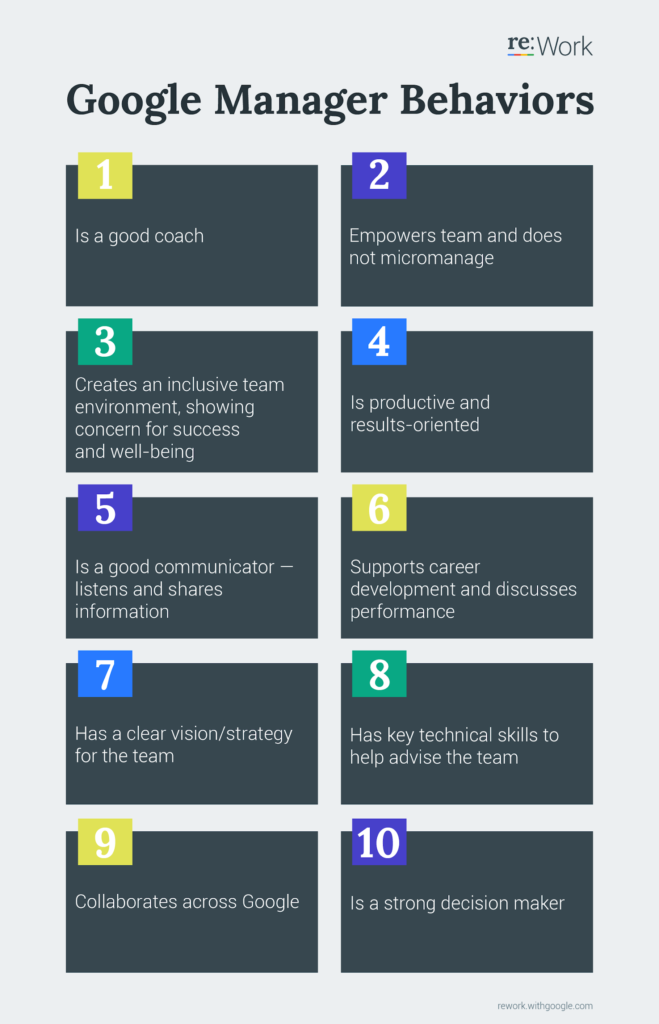In the 21st century, it’s not enough to rely on firsthand experience and consultants to train great managers: You also need the right data. That’s an interplay of factors at which Google excels.
In fact, Google is known for having some of the best managers in the world. Ever wonder how they train them? Let’s take a look at Project Oxygen and how its findings helped Google’s managers gain such a stellar reputation.
My featured article in Entrepreneur Magazine
What is Project Oxygen?
Project Oxygen was a research study at Google that had relatively inauspicious beginnings. Developers at the company had long complained about bad management stifling innovation, so Google’s People Innovation Lab decided to conduct an experiment: Its principals hired statisticians to evaluate the differences between high- and low-rated managers. Included in that analysis was data from past performance appraisals, employee surveys, and interviews.
Some observers assumed that the Project Oxygen analysis would prove that manager quality does not impact individual team members’ performances. Others thought it would impact individual performance. Unsurprisingly, the latter camp was right.
What were the findings?
Specifically, Project Oxygen’s results showed that manager quality does have an impact on performance. And to confirm its findings, the Project Oxygen survey, first conducted in 2008, was repeated and refreshed, in 2018. Following are the top 10 behaviors Google’s People Innovation Lab concluded that its best managers shared

What happened next?
As a result of Project Oxygen’s data-driven findings, Google decided to rethink its approach to management altogether.
The first thing the company did was revamp its employee-feedback surveys. Previously, those surveys had focused on manager output. But Google started including questions about whether, in the view of the employees involved, managers spent time coaching the team, communicated a clear vision, etc.
The next step was to refresh the management culture itself. Every manager at Google was made aware of Project Oxygen’s results and took steps to align himself or herself with the 10-point list.
According to Michele Donovan, head of People Operations at Google, the key finding from the project could be summed up as, “Having a good manager is essential, like breathing,” she told Laszlo Bock (former head of People Operations at Google) for his book Work Rules.
Added Donovan: “If we make managers better, it would be like a breath of fresh air.”
How you can improve your own management culture.
Since Google did the hard work for other companies by identifying “great manager” traits, you may now find it a lot easier to improve the management culture at your own organization, using that same 10-point checklist. But first ask yourself these crucial questions:
1. What’s your leadership or management style?
When I asked Marvin Chow, VP of marketing at Google, how he hires, he answered, “We hire the best, and people who are culture fits.” This simple mantra has allowed him to surround himself with high performers. It also makes it easier for him to coach and mentor them.
How do you interact with the team you’re managing? How do you treat each employee under your supervision? Do you encourage and motivate or micromanage and criticize?
Micromanaging doesn’t really work in the long run; it’s more of a Band-Aid than a remedy for poor performance. The goal of each manager should be to empower his or her team through effective coaching. A great manager is a mentor, someone whom employees are willing to entrust with their careers.
2. How do you empower employees to do their best?
In a YouTube video entitled Academy on Air: Project Oxygen: Why Managers Matter, Kevin Burkhard, head of Online Support and Education at Google, said that empowering team members helps Google managers achieve three key benefits:
- Increases ownership and engagement of the team
- Facilitates individual team member growth
- Scales the impact of the entire team
But none of these benefits is possible if a manager doesn’t start by building trust: “The foundation of empowerment for me is building a culture of trust within the team,” Burkhard said. “If the team feels like they have a level of safety and trust and know that coaching and feedback are coming in the spirit of improvement … they actually feel very empowered to make those decisions.
“Even if they make mistakes along the way, they know that it’s a process of growing.”
3. How do you coach employees when they are struggling?
All too often, middle managers inadvertently create a culture of mistrust, where people are afraid to speak up. This kind of attitude really causes problems when employees are struggling because they’ll probably try to hide it rather than ask for help.
Too often we think that the ultimate goal of team empowerment is to help the team (and by extension the team leader) operate at peak efficiency. But it’s just as important to make sure every single team member is operating at peak confidence, too. That’s impossible to accomplish without a culture of trust.
Sundar Pichai, Google’s CEO, said on a visit to his alma mater, The Indian Institute of Technology-Kharagpur: “As a leader, a lot of your job is to make [your team] successful. It’s less about trying to be successful (yourself), and more about making sure you have good people and your work is to remove that barrier, remove roadblocks for them so that they can be successful in what they do.”
Good managers are like oxygen.
Although your employees may never come out and say things like “I’m not sure what I’m doing … can you walk me through this?” or “I’m feeling a little burned out today” a great manager will pay attention and problem-solve based on the individual needs and goals of each member of his or her team.
Do your own team members value your mentorship and coaching? Do they grow in their careers and become better at their jobs because you touched their lives in a positive, meaningful way? Just how much “like oxygen” is your leadership?








